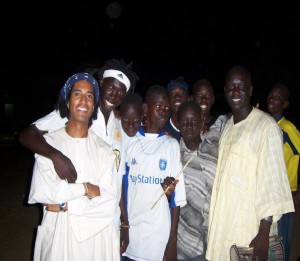
Mike Stanton, 2005-2006, Senegal (left), playing the Tama drum at a traditional town music celebration in Dakar with members of the Diouck family
I decided to apply for a Fulbright U.S. Student Program grant as an At-Large candidate (not enrolled at the time of application) because after I received my bachelor’s degree, I was interested in possibly attending graduate school in psychology and was not certain which type of degree suited my needs best. Working with a professor I had known since my undergraduate study abroad experience in Senegal, I was able to find my Fulbright affiliation and mentor, Dr. Myayang Niang – a professor, NGO director, medical doctor, and scientist.
During my Fulbright year in Senegal, I found that volunteering and engaging in community work were as important to my professional development as my psychological research. I worked with volunteers to build a cyber-café for medical students at Dakar University, mentored homeless children at a shelter, provided care to villagers in a remote health clinic, and taught American History and English classes to high school students at U.S. Department of State-sponsored events in Dakar.
For my Fulbright research, I used World Health Organization questionnaires to examine how stress may be associated with psychological/physical distress and how it can vary depending upon rural and urban settings in Senegal. Once back in the United States, this research ended up providing me with the impetus to apply to Ph.D. programs focusing on multicultural psychology and medicine. Currently, I am in my last year of a clinical psychology and behavioral medicine Ph.D. program at Duke University, and am a behavioral medicine intern within the Veterans Affairs Palo Alto Health Care System.
Although it may require a great deal of initiative to apply for a Fulbright grant as an At-Large candidate, and anyone enrolled in an institution (or a few years out of college) should work with a campus Fulbright Program Adviser whenever possible, I found the process to be very manageable. I was able to develop my application materials in a reasonable amount of time and was glad that I had waited several years after graduating from college, since by the time I applied for a Fulbright, I felt more mature and ready to dive into an exciting year overseas. I highly recommend pursuing a Fulbright grant to anyone with an adventurous spirit, the requisite skills to pursue what they propose to do, and at least a handful of burning questions to explore in another country for a very memorable, life-changing year.
For more information about Michael’s Fulbright experiences, click here to read his article in the International Psychology Bulletin (page 65).

No Comments